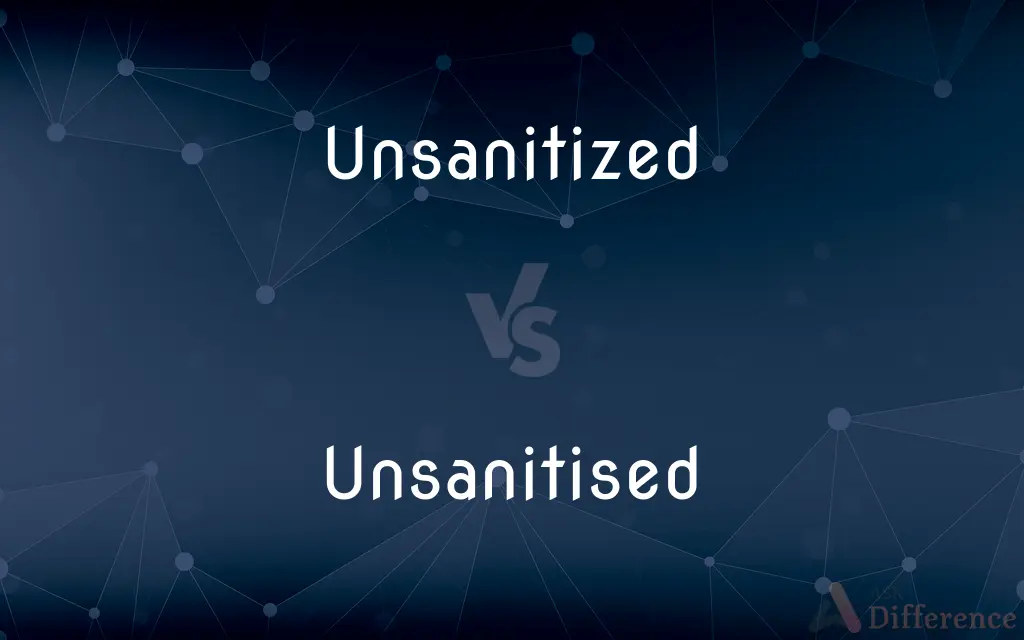Unsanitized vs. Unsanitised — What's the Difference?
By Fiza Rafique & Urooj Arif — Updated on March 25, 2024
Unsanitized and Unsanitised refer to the same concept of not being cleaned or disinfected, but their usage varies by region, with "unsanitized" common in American English and "unsanitised" in British English.

Difference Between Unsanitized and Unsanitised
Table of Contents
ADVERTISEMENT
Key Differences
Unsanitized (American English) and Unsanitised (British English) both describe conditions or items that have not undergone a cleaning process to remove germs, bacteria, or viruses. The difference primarily lies in the regional spelling preference, reflecting the linguistic variations between American and British English.
The term applies broadly across contexts such as healthcare, public sanitation, and data handling, indicating a lack of cleaning or purification. Whether it's "unsanitized" or "unsanitised," the focus is on the absence of measures taken to ensure cleanliness or data integrity.
In the healthcare sector, "unsanitized" instruments may pose a risk of infection, while "unsanitised" might be used in British publications to describe the same risk. The importance of using the correct regional spelling helps maintain clarity and consistency in communication.
When discussing data, both terms can be used to describe information that has not been processed to remove sensitive or confidential elements. The choice between "unsanitized" and "unsanitised" follows the same regional preferences, ensuring that the message is clearly understood by the intended audience.
In everyday usage, whether one encounters "unsanitized" or "unsanitised" surfaces or facilities, the implication is the same: a need for cleaning to meet hygiene standards. The distinction is purely orthographic, without difference in application or meaning.
ADVERTISEMENT
Comparison Chart
Definition
Not cleaned or disinfected
Not cleaned or disinfected
Usage
Preferred in American English
Preferred in British English
Contexts
Healthcare, public sanitation, data handling
Healthcare, public sanitation, data handling
Example Usage
Unsanitized surfaces in a restaurant
Unsanitised surfaces in a restaurant
Orthographic Note
Reflects American spelling conventions
Reflects British spelling conventions
Compare with Definitions
Unsanitized
Lacking in removal of potentially harmful elements.
Sharing unsanitized opinions can sometimes lead to misunderstandings.
Unsanitised
The absence of efforts to make a safe environment.
Tourists were warned about unsanitised accommodations in the area.
Unsanitized
Not cleaned with a disinfectant.
The unsanitized kitchen equipment posed a health risk.
Unsanitised
Public facilities lacking proper sanitation measures.
The unsanitised condition of the swimming pool led to its closure.
Unsanitized
Objects or areas posing health risks due to lack of disinfection.
The hospital was criticized for its use of unsanitized medical instruments.
Unsanitised
Surfaces not cleaned properly to remove germs.
The report highlighted the dangers of unsanitised public transport.
Unsanitized
Data not stripped of sensitive information.
Unsanitized user data can lead to privacy breaches.
Unsanitised
The state of not undergoing a cleansing process to ensure health safety.
The food processing plant was shut down for operating with unsanitised equipment.
Unsanitized
Environments not treated to kill germs.
The outbreak was traced back to an unsanitized water cooler.
Unsanitised
Information that contains risky or sensitive details.
The document was released without being unsanitised, causing a security concern.
Unsanitized
Not having been sanitized; unsanitary.
The dirty dishes are unsanitized.
Unsanitised
Alternative spelling of unsanitized
Unsanitized
Of information: which has not been censored or cleaned up.
The leaked inter-office memo was unsanitized.
Common Curiosities
Can both terms apply to digital data?
Yes, both terms can describe data that hasn't been cleaned of sensitive information.
How does one convert an "unsanitized" condition to a "sanitized" state?
Through thorough cleaning and disinfection practices to eliminate harmful germs and bacteria.
How do the terms relate to personal hygiene?
They highlight the importance of regular cleaning and disinfection of personal items to prevent illness.
Are "unsanitized" and "unsanitised" interchangeable?
Yes, they are interchangeable, with the choice depending on the regional spelling preference.
Can a product be marketed as "unsanitized"?
Typically, products are marketed for their ability to sanitize, not for being unsanitized, as the latter implies a lack of safety or cleanliness.
How do sanitizing standards vary internationally?
Standards can vary based on local health regulations and guidelines, though the underlying principles of cleanliness and disinfection remain consistent.
Is there a difference in how "unsanitized" and "unsanitised" are used in healthcare?
No, the usage is the same; the difference is purely in spelling.
Are there guidelines for sanitizing public spaces?
Yes, public health organizations provide guidelines for sanitizing public spaces, especially in response to outbreaks.
What role does sanitization play in pandemic response?
Sanitization is crucial in preventing the spread of the virus by keeping surfaces and environments clean.
What risks do "unsanitized" or "unsanitised" conditions pose?
They can lead to the spread of infections, diseases, and in the case of data, privacy breaches.
Share Your Discovery

Previous Comparison
Monologue vs. Soliloquy
Next Comparison
Pensive vs. ReflectiveAuthor Spotlight
Written by
Fiza RafiqueFiza Rafique is a skilled content writer at AskDifference.com, where she meticulously refines and enhances written pieces. Drawing from her vast editorial expertise, Fiza ensures clarity, accuracy, and precision in every article. Passionate about language, she continually seeks to elevate the quality of content for readers worldwide.
Co-written by
Urooj ArifUrooj is a skilled content writer at Ask Difference, known for her exceptional ability to simplify complex topics into engaging and informative content. With a passion for research and a flair for clear, concise writing, she consistently delivers articles that resonate with our diverse audience.
















































